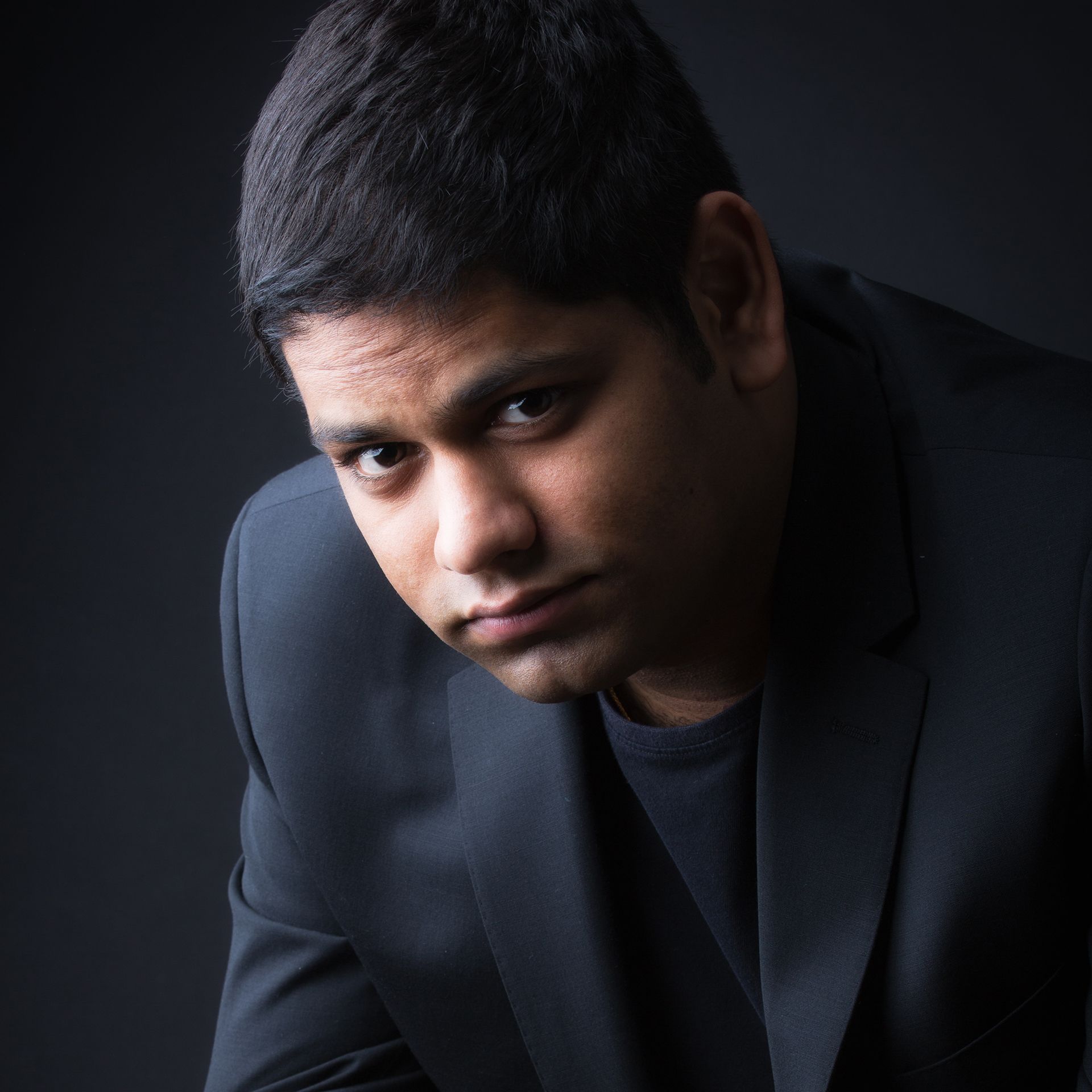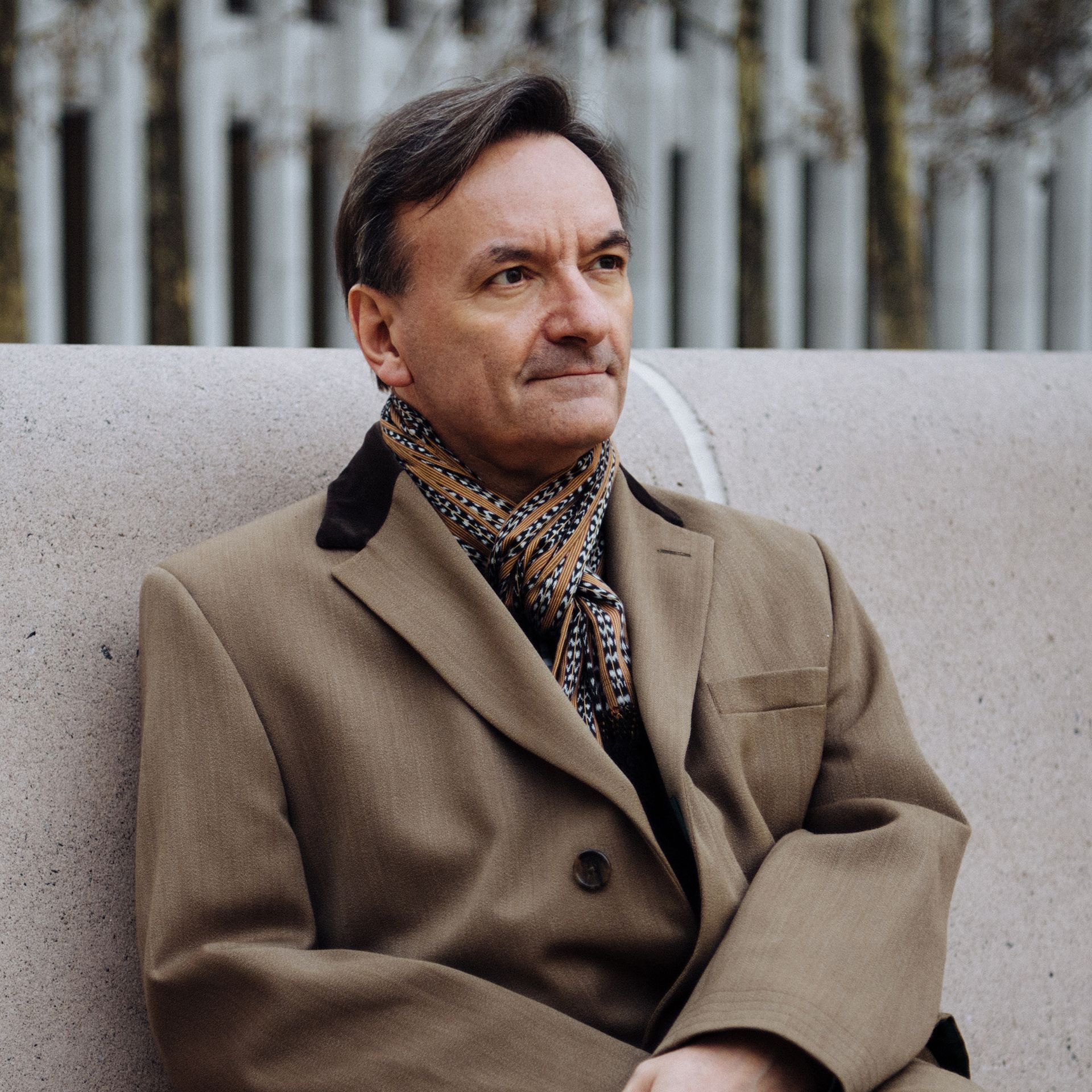Stephen Hough Plays Rachmaninov
Friday 27 May 2022, 7.30pm

Richard Baker
The Price of Curiosity c9’
BBC commission: world premiere
Sergey Rachmaninov
Rhapsody on a Theme of Paganini 24’
INTERVAL: 20 minutes
Anton Bruckner
Symphony No. 9 in D minor 63’
Stephen Hough piano
Alpesh Chauhan conductor

This concert is being broadcast live by BBC Radio 3. It will be available for 30 days after broadcast via BBC Sounds, where you can also find podcasts and music mixes.
Help us Improve Our Online Programmes.
Please take this 5-minute survey and let us know what you think of these notes.
Programme Survey
For its Barbican season finale, the BBC Symphony Orchestra is joined by Alpesh Chauhan, who conducts a wide-ranging programme that contrasts popular influences with one of the high points of the Austro-German symphonic tradition.
Richard Baker’s The Price of Curiosity takes its title from a line of dialogue in Alfred Hitchcock’s 1956 film The Man Who Knew Too Much and is coloured in ingenious ways by the song ‘Que sera, sera’, sung by Doris Day in the film – a favourite of the composer’s since childhood. The piece receives its world premiere tonight, having originally been scheduled for March 2020, only days after the first UK lockdown came into place.
Rachmaninov’s evergreen Rhapsody on a Theme of Paganini takes a familiar theme from one of Paganini’s solo-violin Caprices, weaving 24 variations around it. Though high-spirited and light-hearted in parts, it also includes storming references to the Dies irae (‘Day of Wrath’) chant that streaked darkly through a number of Rachmaninov’s works.
Had Bruckner not undertaken a number of revisions to earlier symphonies after composing his Eighth, we might have a complete Ninth Symphony. As it happened, he died before finishing the Ninth’s finale, leaving three completed movements but no indication of whether his symphonic swansong would end in struggle or affirmation.
Richard Baker (born 1972)
The Price of Curiosity (2019)
BBC commission: world premiere

When the news broke of Doris Day’s death in spring 2019, I found myself thinking of my late mother and grandmother. Day was a particular favourite of theirs. One of my earliest memories is of my mother singing to me the song ‘Que sera, sera’. The next day, I sang it to my primary-school music teacher (who, I think, was charmed and amused in equal measure). My grandmother gave me her 78rpm disc as a contribution to my burgeoning collection. I used to play it repeatedly on a portable mono turntable at high volume, either during the school holidays or when off school with illness.
But the song, of course, has a context: it was composed by Jay Livingston with lyrics by Ray Evans, and originally commissioned by Alfred Hitchcock for his 1956 remake of The Man Who Knew Too Much. Hitchcock gave the songwriters no directions about what kind of song he wanted, but declared himself delighted when first presented with it. It helps to establish the close bond between Day’s character, Jo, and that of her son Hank; it reappears at the film’s tense denouement. It also hints at the life as a stage performer that Jo left behind to become the wife of Ben, a successful doctor (played by James Stewart). Of course, music plays a further pivotal role in the film, in a scene where a hitman attempts a murder during an orchestral concert at the Royal Albert Hall, his gunshot covered by a climactic crash of cymbals.
In perhaps the film’s most suspenseful and disturbing scene, Ben coerces Jo into taking a sedative against her will in an attempt to blunt her reaction when he tells her the news that Hank has been kidnapped. Throughout Ben’s long exposition, he is waiting for signs that it is safe to deliver his devastating message and, even though the sedative has already begun to take effect, Jo’s justifiable rage at being manipulated, and her grief at the thought of losing her son, is explosive. It is a remarkable performance by both actors and an example of Hitchcock’s masterful pacing.
If this scene was disturbing in 1956, it makes for deeply uncomfortable viewing over 60 years later. Again, I think of my mother and grandmother (and of so many other women) whose emotional lives were subtly or openly policed, and the ways in which their reactions to trauma were pathologised.
All of these ideas fed into the piece. At its heart is a very literal kind of interference between pitches taken from the melody of ‘Que sera, sera’ and melodies transcribed from the actors’ speech patterns during the sedation scene. After a short introduction in which a repeated chord (based on an analysis of a pair of crashing cymbals) transforms into an expanding and quickening chorale, we cut to the scene in the Marrakech hotel, as James Stewart presses the tablets on a reluctant Doris Day. They represent, he says, ‘the price of curiosity’.
Programme note © Richard Baker
Richard Baker
The music of Richard Baker reveals a refined sensibility deeply engaged with aspects of meaning in contemporary culture, mediated through memories and associations at once playful and profound, collective and intensely personal. A leading composer and conductor of his generation, Baker increasingly draws on existing artworks in such a way that the original permeates his music, yet is effectively absent from it.
Born in Dudley in 1972, upon graduating from Oxford University Baker studied with Louis Andriessen, then John Woolrich. After winning wide attention with Los Rábanos (1998) and the basset clarinet concerto Learning to Fly (1999), his subsequent works include Slow passage, low prospect (2004), collaborating with poet Lavinia Greenlaw.
Baker was appointed Kettle’s Yard New Music Fellow (2001–3), then Director of Music at Trinity Hall, Cambridge, before joining the staff at the Guildhall School of Music & Drama in 2004. Recent conducting highlights include operas by Gerald Barry and Philip Venables, alongside concerts across Europe with BIT20 and Crash Ensemble.
A close association with the Birmingham Contemporary Music Group has notably yielded Hommagesquisse, for Boulez’s 2008 city visit, and The Tyranny of Fun (2013). This latter signalled through its humane, astutely queer perspective the intelligence and vitality that characterise Baker’s first orchestral piece, The Price of Curiosity (2019).
Profile © Steph Power
Steph Power is a composer and chair of Tŷ Cerdd, Music Centre Wales. She writes on music for a number of publications, including BBC Music Magazine, The Stage and Classical Music magazine, and has contributed two chapters to The Music of Simon Holt (Boydell, 2017).
Sergey Rachmaninov (1873–1943)
Rhapsody on a Theme of Paganini, Op. 43 (1934)

Stephen Hough piano
Written in 1934 on Rachmaninov’s Swiss estate, the Rhapsody on a Theme of Paganini is a single movement of 24 variations on the famous theme from Paganini’s 24th Caprice. Paganini’s original was itself a virtuoso set of variations, and also became the model for piano variations by Liszt and Brahms. Rachmaninov extended the tradition to the concerto. The Rhapsody has an American sheen, with subtle hints of jazz and popular music of the time. This led the New Yorker magazine to dismiss the piece as ‘music for audiences’ (presumably as opposed to music for the critics?).
While planning a ballet based on the Rhapsody, Rachmaninov revealed to the choreographer the story he had in mind when he had composed the piece. He drew on the old legend of Paganini selling his soul to the Devil in exchange for superhuman virtuosity on the violin (as well as the power to attract whatever women he chose). The other side of the bargain is represented by the opening notes of the Dies irae requiem chant, which had become a symbol of death and the macabre in the music of the previous century. Rachmaninov himself was given to morbid reflections, and he used the Dies irae motto quite obsessively, from his early masterwork, the First Symphony, through to his swansong, the Symphonic Dances. The Rhapsody, then, was written by one virtuoso about another, and vents the composer’s own fears, sometimes trying to make light of them – and sometimes not.
Rachmaninov lavished great attention on the score, which is possibly the most intricate of all his works. The massive orchestra far exceeds the norm for concertos and the extended percussion section features prominently. The piano is woven tightly into the orchestration, and Rachmaninov creates a succession of captivating and highly original sonorities. The first variation, for example (just after the short Introduction and before the actual theme), states the bass line only, and we hear the piano’s single notes coloured by whispers from the side-drum and cymbals with the tinkling of the glockenspiel. In Variation 2 (just after the first statement of the theme), the piano’s grace notes are immediately picked up by the trumpet and the horn, resulting in a kind of sinister cackling. Each variation in turn contains new inspirations as striking as these.
There are some landmarks that can be picked out easily. In Variation 7, the Dies irae appears alongside Paganini’s motif for the first time; Variations 11 and 15 both contain cadenzas for the piano alone; Variation 18 turns the Paganini motif upside down, but the result is a luscious love episode. Rachmaninov keeps us on the edge of our seats until the end: will the hero manage to escape from the infernal bargain?
Sergey Rachmaninov
Sergey Rachmaninov entered the stage as a remarkable, once-in-a-century pianist, a gifted conductor and a composer whose first opera was blessed by Tchaikovsky. He seemed to have it all, but the failed premiere of his ambitious First Symphony in 1897 was a terrible setback that plunged him into a lengthy bout of depression and affected his confidence for the rest of his life. He emerged a winner, writing piano concertos, solo piano works, operas and songs that won him a wide popular following both in Russia and abroad. After the Bolshevik Revolution of 1917, when his country estate was ransacked, he emigrated from Russia and reinvented himself as a full-time touring pianist, only occasionally setting aside time to compose. Despite the condescension of the critics, who dismissed him as a relic of the past and his popularity as a passing fad, his music has stood the test of time. His work often took on a second life in popular culture, when it was taken up in film scores and pop songs. Rachmaninov’s melodies flowed from sources in Russian folk and liturgical music but have become internationally recognisable symbols of deep human passion.
Programme note and profile © Marina Frolova-Walker
Marina Frolova-Walker is Professor of Music History at the University of Cambridge and Fellow of Clare College, Cambridge. She is the author of Russian Music and Nationalism from Glinka to Stalin and Stalin’s Music Prize: Soviet Culture and Politics.
INTERVAL: 20 MINUTES
Anton Bruckner (1824–96)
Symphony No. 9 in D minor (1887–96)

1 Feierlich [Solemn], Misterioso
2 Scherzo: Bewegt, lebhaft [With movement, lively] –
Trio: Schnell [Fast] – Scherzo
3 Adagio: Langsam, feierlich [Slow, solemn]
Bruckner started work on his Ninth Symphony in August 1887. He was still working on it on the day he died, nine years later. Various reasons have been given for his failure to complete it: his physical health was declining; and, as Bruckner’s anxiety about the symphony increased, so did the bizarre obsessive behaviour that had worried his friends in the past. There were also too many professional distractions, partly self-imposed: extensive revisions of four symphonies and two of his Masses, plus the composition of two substantial choral works, Psalm 150 and the cantata Helgoland.
But Bruckner had good reason to take special pains over the Ninth Symphony. It was to be nothing less than a summing-up of his life’s achievement, incorporating quotations from some of his most successful works. Then there was the implied tribute to one of his musical idols. In one of his lectures at the University of Vienna, Bruckner told the class: ‘I’ll write my last symphony in D minor, just like Beethoven’s Ninth. Beethoven won’t object.’ Beethoven might not complain but others might make unflattering comparisons. Most of all, the symphony was to bear the dedication ‘dem lieben Gott’ (‘to the dear Lord God’), thus indicating that for Bruckner the Ninth was a special expression of his lifelong Roman Catholic faith – perhaps not as unquestioning as some have asserted but certainly central to his life. Bruckner’s doctor, Richard Heller, reports that Bruckner ‘had drawn up a contract with his “dear Lord God”. If He willed that the symphony, which was indeed to be a hymn of praise to God, should be finished, He should give Bruckner the time he needed for his task; if he died too soon and his musical offering was left incomplete, God had only himself to blame.’
It was to be a close-run thing. When Bruckner died on 11 October 1896, he was in all probability working on the last pages of the sketch-score – to which it appears souvenir-hunters helped themselves after Bruckner’s death. Where they ended up is anyone’s guess. Dr Heller recorded how Bruckner ‘went over to the piano and played me parts of the symphony with shaking hands, but with undiminished accuracy and strength. I have often regretted the fact that I cannot play or write down music after one hearing,’ he adds, ‘because then I might be able to give some idea of the end of the Ninth Symphony.’ Bruckner’s biographer Max Auer claimed that he saw a page of the score – at or near the end of the finale – in which all the leading themes are ‘piled on top of each other, as in the finale of the Eighth Symphony’. A few precious extra leaves of sketch-score have turned up in recent years but this crucial page was not among them.
Mercifully, the three movements Bruckner did complete in full orchestral score make a satisfying musical experience in their own right. In fact, the structure they form – two long, slow-paced movements framing a compact, faster Scherzo with a central Trio – is remarkably well balanced. Moreover, the climax of the Adagio is quite powerful enough to form the high point of an hour‑long symphony, though this terrifying, dissonant fff is surely not the kind of vision Bruckner intended as the high point of his last symphony. Fortunately the quietly resigned coda, with its fleeting references to earlier works, can be seen as a kind of answer to the dark probing of the first movement and the nightmare visions of the Scherzo.
Programme note © Stephen Johnson
Stephen Johnson is the author of books on Bruckner, Wagner, Mahler and Shostakovich, and a regular contributor to BBC Music Magazine. For 14 years he was a presenter of BBC Radio 3’s Discovering Music. He now works both as a freelance writer and as a composer.
Anton Bruckner
Bruckner’s path to recognition was a slow and arduous one, partly confounded by his passionate but unpopular advocacy of Wagner. Born in Upper Austria in 1824, he began his career as an organ teacher at the Church of St Florian, where he had earlier been a choral scholar. In 1856 he became organist at nearby Linz Cathedral, and seven years later was deeply and lastingly affected by Wagner’s opera Tannhäuser. Until now his compositions centred on sacred music – he was devoutly religious throughout his life – but in 1866 he produced his First Symphony. It was only with the premiere of his Fourth (1881), well into his fifties, that he first gained public recognition. Even today, Bruckner’s symphonies divide both experts and music-lovers. His detractors talk of bombast, empty rhetoric and uninspired thematic material, while his supporters admire his grand architectural scale and spiritual radiance. To his great delight he became the first musician, in 1891, to be honoured with a PhD from the University of Vienna.
Profile by Edward Bhesania © BBC
Coming up at the Barbican
Wednesday 5 October 2022, 7.30pm
Oramo conducts Rachmaninov
Boris Giltburg plays Rachmaninov and Sakari Oramo conjures sounds of pure enchantment as the BBC Symphony Orchestra opens its new season with a glittering programme.
Book tickets

Biographies
Alpesh Chauhan conductor

Born in Birmingham, Alpesh Chauhan studied the cello, and later conducting, at the Royal Northern College of Music in Manchester. He is the newly appointed Principal Guest Conductor of the Düsseldorfer Symphoniker, as well as Music Director of Birmingham Opera Company and Associate Conductor of the BBC Scottish Symphony Orchestra. He was previously Principal Conductor of the Filarmonica Arturo Toscanini Parma and Assistant Conductor at the City of Birmingham Symphony Orchestra.
He appears frequently as a guest conductor with orchestras such as the BBC, London and Royal Philharmonic orchestras, BBC National Orchestra of Wales, London and Malmö Symphony orchestras, Philharmonia Orchestra and Orchestre National d’Île-de-France. He also regularly collaborates with artists such as Nicola Benedetti, Karen Cargill, Boris Giltburg, Benjamin Grosvenor, Stephen Hough, Pavel Kolesnikov and Johannes Moser, among others.
Highlights of the 2021–22 season include his opening concert as Principal Guest Conductor in Düsseldorf (Beethoven’s Sixth Symphony), returns to the Philharmonia and BBC Scottish Symphony Orchestra, his debut with the Bournemouth Symphony Orchestra, a tour with the Orchestra of the Accademia di Santa Cecilia and recording and symphonic projects with the BBC Scottish Symphony Orchestra.
A keen advocate for music education, he is a patron of Awards for Young Musicians and has worked with the National Youth Orchestra of Scotland and the symphony orchestras of the Royal Conservatoire of Scotland and the RNCM. He was also on the judging panels for the 2016 and 2018 editions of BBC Young Musician. Last year he was named ‘Newcomer of the Year’ at the International Opera Awards.
Stephen Hough piano

Photo: Jiyang Chen
Photo: Jiyang Chen
Named by The Economist as one of 20 Living Polymaths, Stephen Hough combines a distinguished career as a pianist with those of composer and writer. He was the first classical performer to be awarded a MacArthur Fellowship and was appointed CBE in the 2014 New Year’s Honours.
This season he performs with the Royal Concertgebouw Orchestra, Orchestre National de France, Dortmund, London and Royal Liverpool Philharmonic orchestras, Atlanta and Dallas Symphony orchestras and Tonkünstler Orchestra. He is the BBC Philharmonic’s 2021–22 Artist-in-Residence and this year returns to the Far East to perform with the Singapore Symphony Orchestra. Recent concerto highlights include engagements with the New York and Royal Philharmonic orchestras, Minnesota Orchestra, City of Birmingham, Finnish Radio, Toronto and Vienna Symphony orchestras and the Philharmonia.
In June 2020 he returned to Wigmore Hall to give the UK’s first live classical music concert in a major venue since the nationwide lockdown earlier that year. Recital highlights this season include a return to London’s Royal Festival Hall as well as to Caramoor, Toronto, Tallinn, Gstaad and the Bridgewater Hall.
His extensive discography has garnered major international awards, including eight Gramophone Awards. Recent releases include Beethoven’s complete piano concertos with the Finnish Radio Symphony Orchestra under Hannu Lintu.
As a prolific composer, his works have been performed throughout the world and include a new commission for the Van Cliburn International Piano Competition this year.
His collection of essays Rough Ideas: Reflections on Music and More, published in 2019, won a 2020 Royal Philharmonic Society Award and was named a Financial Times Book of the Year in 2019. His first novel, The Final Retreat, was published in 2018.
He is a Visiting Professor at the Royal Academy of Music, International Chair of Piano Studies at the Royal Northern College of Music and is on the faculty of the Juilliard School in New York.
BBC Symphony Orchestra
The BBC Symphony Orchestra has been at the heart of British musical life since it was founded in 1930. It plays a central role in the BBC Proms at the Royal Albert Hall, performing at the First and Last Night each year in addition to regular appearances throughout the Proms season with the world’s leading conductors and soloists.
The BBC SO performs an annual season of concerts at the Barbican in London, where it is Associate Orchestra. Its commitment to contemporary music is demonstrated by a range of premieres each season, as well as Total Immersion days devoted to specific composers or themes.
Highlights of the current season have included concerts conducted by Sakari Oramo with music by Beethoven, Brahms, Ruth Gipps, Dora Pejačević, Sibelius and others; performances with Principal Guest Conductor Dalia Stasevska, including the devised work Concerto No. 1: SERMON by Davóne Tines, combining music and poetry in a unique examination of racial justice; children’s author Jacqueline Wilson reading from her best-selling books in a family concert; the world premiere of Up for Grabs by composer and Arsenal fanatic Mark-Anthony Turnage; the BBC Symphony Chorus’s return to the Barbican stage for a Christmas concert; a performance with Jules Buckley and Canadian singer-songwriter Patrick Watson; a live performance, with the BBC SC, of Vaughan Williams’s score for Scott of the Antarctic, alongside a screening of the film; a concert celebrating the 100th anniversary of the BBC; and two Total Immersion days, one focusing on music composed in the camps and ghettos of Nazi-occupied Europe and one featuring the music of Frank Zappa. Guest conductors have included John Storgårds, Jukka-Pekka Saraste, Jordan de Souza and Nathalie Stutzmann.
The vast majority of performances are broadcast on BBC Radio 3 and a number of studio recordings each season are free to attend. These often feature up-and-coming new talent, including members of BBC Radio 3’s New Generation Artists scheme. All broadcasts are available for 30 days on BBC Sounds and the BBC SO can also be seen on BBC TV and BBC iPlayer and heard on the BBC’s online archive, Experience Classical.
The BBC Symphony Orchestra and Chorus – alongside the BBC Concert Orchestra, BBC Singers and BBC Proms – also offer enjoyable and innovative education and community activities and take a leading role in the BBC Ten Pieces and BBC Young Composer programmes.
Chief Conductor
Sakari Oramo
Principal Guest Conductor
Dalia Stasevska
Günter Wand Conducting Chair
Semyon Bychkov
Conductor Laureate
Sir Andrew Davis
Creative Artist in Association
Jules Buckley
First Violins
Igor Yuzefovich
Cellerina Park
Philip Brett
Jeremy Martin
Jenny King
Celia Waterhouse
Colin Huber
Shirley Turner
Ni Do
James Wicks
Will Hillman
Emma Crossley
Kate Cole
Alexandra Lomeiko
David Larkin
Second Violins
Heather Hohmann
Dawn Beazley
Nihat Agdach
Daniel Meyer
Patrick Wastnage
Danny Fajardo
Lucy Curnow
Rachel Samuel
Tammy Se
Caroline Cooper
Victoria Hodgson
Lucica Trita
Sarah Thornett
Eleanor Bartlett
Violas
Rebecca Chambers
Philip Hall
Joshua Hayward
Nikos Zarb
Audrey Henning
Natalie Taylor
Michael Leaver
Carolyn Scott
Mary Whittle
Peter Mallinson
Rebecca Breen
Cellos
Tim Gill
Tamsy Kaner
Graham Bradshaw
Mark Sheridan
Clare Hinton
Sarah Hedley Miller
Domitille Jordan
Gilly McMullin
Double Basses
Paul Sherman
Richard Alsop
Anita Langridge
Michael Clarke
Beverley Jones
Josie Ellis
Flutes
Michael Cox
Tomoka Mukai
Piccolo
Emma Williams
Oboes
Alison Teale
Imogen Smith
Cor Anglais
Max Spiers
Clarinets
James Burke
Marie Lloyd
Bass Clarinet
Thomas Lessels
Bassoons
John McDougall
Ruth Rosales
Lorna West
Contrabassoon
Steven Magee
Horns
Martin Owen
Michael Murray
Francisco Gomez
Nicholas Hougham
Alexei Watkins
Elise Campbell
Joel Ashford
Tom Kane
Phillippa Koushk-Jalali
Trumpets
Philip Cobb
Martin Hurrell
Joseph Atkins
Matthew Williams
Trombones
Helen Vollam
Dan Jenkins
Ryan Hume
Jayne Murrill
Bass Trombone
Robert O’Neill
Tuba
Sam Elliott
Timpani
Antoine Bedewi
Christopher Hind
Percussion
David Hockings
Alex Neal
Fiona Ritche
Harp
Anne-Sophie Bertrand
The list of players was correct at the time of publication

